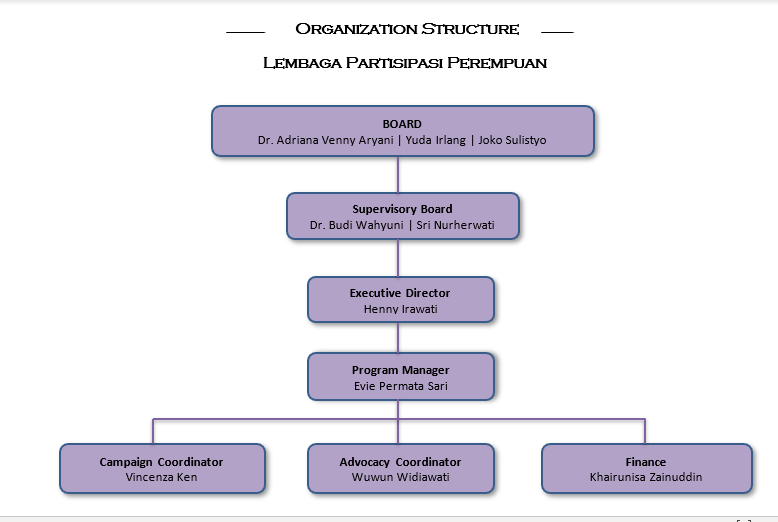- (021) 8078 5142
- partisipasiperempuan@gmail.com
In 2023, LP2 was conducting some activities, including second batch feminist class (training) with its follow-up plans, such as mentoring and activities carried out by alumni of LP2’s young feminist class, such as podcast, and others.
LP2’s activities That Have Been Done In 2023:
The most important thing achieved in this activity is the fact that LP2 can penetrate young people, amidst the social conditions in which young people today live in media technology, the world of social media that greatly influences their lives, hedonism and impopularity of gender issues and feminism (feminist get stigma of weird, liberal, etc.).
Young women of feminist class then built a new awareness and some became aware that as long as they were victims, LP2 also discovered that they were the victims of GBV, so with feminism classes and feministic writing workshops they managed to rise to be survivors and then become agents of change for their community and can help other young women.
As an additional information, LP2 also reminds the trigger warning and prepares the Consul in every activity carried out because usually then there is something triggered by his experience as a victim. So it can be said that LP2 provides victim support if necessary. LP2 also helped to strengthen the unit task of preventing and handling sexual violence (Satgas PPKS) on campus because all the feminism class participants are student status so with the knowledge of feminism they can support Satgas PPKS in their campus.
In universities life, they as students have their own challenges, for example, when they are want to make a thesis or thesis about feminism, not necessarily supported by a lecturer and their mentor lecturer, then they need adequate information and networking so that they can be guided by a proper lecturer who understands gender issues sufficiently.
On the other hand, the problems faced by NGOs in almost all countries are almost the same: The problem of shrinking spaces or narrowing their spaces of movement and especially funding, also facing almost all NGO in Indonesia. The WFA is present and helps small NGOs like LP2 so that they can survive and contribute to the lives of Indonesian women to be better.
Basically knowledge of gender justice and feminism is a life skillhood, the ability to survive, adequate knowledge to prevent them from becoming victims, or when they have become victims they can still continue to live. Third, they can be at the point of helping other women who are victims.
From the side of the women’s movement, the women’s movement has also benefited from the feminist class because shrinking space has caused women NGOs to suffer an activist crisis and difficulty finding volunteers and victim’s caregiver. A feminist class with three modules, namely: Feminism, SRHR and Advocacy and Coalition awarded new volunteers who are interested because their status is a student plus they have a certificate of feminist training so they are ready to be thrown into volunteer cadres, then the Indonesian women’s movement will still sustained.
The feminist writing workshop also helps young women to write down their experiences related to gender issues, their expectations and interests in the women’s movement. It will be an inspiration for other young women.
There are about 17 writings compiled in this feminist writing workshop. Some of the participants wrote about the journey of the sexual violence bill until it was passed. One participant wrote about her experiences doing advocacy for victims of GBV, some participants wrote about GBV faced by women workers, some also wrote about women’s participation in politics and there is also participants who wrote about queer ecology.
The programs undertaken by LP2 this year include feminist training, feminist writing workshops and the publication of three books to help LP2 continue to develop knowledge and strengthen the women’s movement, strengthening the national human rights agency with a specific mandate, namely the national commission on violence against women (Komnas Perempuan) and local women NGOs, by producing new activists.
Opportunities also came from other groups like migrant workers and women workers who are also interested in studying feminism. It’s a new opportunity for LP2 to be able to disseminate knowledge about feminism, SRHR and advocacy skills to a wider communities.
Encourage young women to disseminate their training results through discussions and webinars within the campus. In addition, universities in Indonesia currently require students to collect cum/ points for graduation requirements. This is an opportunity for LP2 to continue to catch up with feminist class participants because that the points to join NGO activities is pretty big. And the certificates issued by LP2 as women NGO are highly recognised/ appreciated by the universities in Indonesia.
Even some male students asked why LP2 did not accept male participants, although LP2 currently prioritizes women participants but in the future will consider to receive male participants considering their intersectionality although the proportion of women still larger.
Herstory:
Established on March 8, 2008, LP2 started from concern about the high rate of gender-based violence in Indonesia. Violence against women both in the public and domestic spheres is increasing, along with the minimal level of women’s participation in public policy-making processes, high levels of harmful practices for girls such as FGMC and child marriage, increasing cases of intolerance, religious fundamentalism/radicalism/violence based on extremism, and the weak implementation of women’s human rights.
Vision:
Realizing an Indonesian society that is free of discrimination against women and other minority groups (religion, belief, custom, sexuality), realizing gender justice, increasing the representation of Indonesian women in the public sphere and in the realm of decision-making, eliminating harmful practices against women and girls, eliminating intolerance and religious fundamentalism, protecting women from radicalism/extremism-based violence, realizing the achievement of the SDGs in Indonesia and overseeing all the implementation of women’s human rights instruments.
Mission:
Focus and Activities:




Working areas: National, with home based: Jakarta, Indonesia.
Networking Partners:

©2024. LP2. All Rights Reserved.